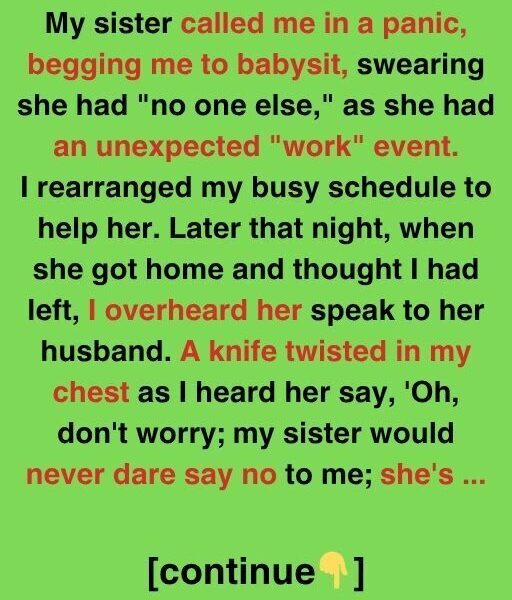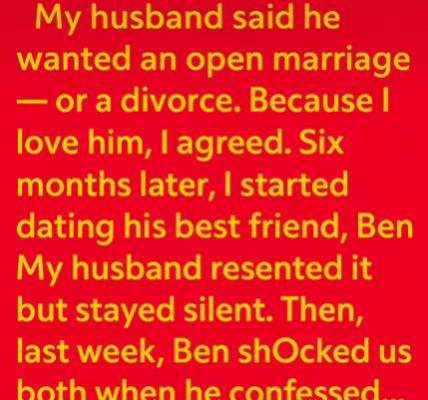My sister called me in a panic, begging me to babysit, swearing she had “no one else,” as she had an unexpected “work” event. I rearranged my busy schedule to help her. Later that night, when she got home and thought I had left, I overheard her speak to her husband.
A knife twisted in my chest as I heard her say, “Oh, don’t worry; my sister would never dare say no to me; she’s always been the easiest person to guilt-trip.”
I stood there in the hallway, half-hidden behind the coat rack, feeling my face go hot with shame and hurt. All these years, I thought I was being kind and helpful, the good sister who could always be counted on. But it hit me like a truck: she saw me as someone to manipulate, not as someone she loved or respected.
I slipped my shoes on quietly, my heart pounding. On the drive home, my mind replayed her words over and over like a cruel song stuck on repeat. I kept asking myself if all those times I dropped everything for her were really moments of love—or just moments of weakness.
I remembered the time she called me in the middle of my own work crisis, sobbing about a broken dishwasher, and I ran to help her. Or the Christmas she “forgot” to buy gifts for her kids, and I stayed up wrapping presents I had bought last-minute so they wouldn’t feel disappointed.
That night, I barely slept. The next morning, I looked in the mirror and saw dark circles under my eyes and a weariness deeper than any physical exhaustion. I realized I had spent years trying to earn a closeness with her that would never come, because she didn’t value me in the way I thought she did.
I thought about canceling our usual Saturday brunch, but I decided to go anyway. I needed to see her, face to face, and maybe, for once, speak up for myself.
When I arrived at the café, she was already there, sitting by the window scrolling through her phone. She looked up, gave me a bright smile, and asked if I could watch the kids again next weekend because she and her husband had plans to “reconnect.” The words felt like tiny pinpricks on my skin. I opened my mouth, but instead of the usual, “Of course,” something different came out.
“I’m sorry,” I said, my voice trembling, “but I can’t. I need that weekend for myself.”
She blinked, like she didn’t quite understand. I repeated it, more firmly this time, and saw something flicker across her face—surprise, maybe even a hint of anger. But I didn’t back down. I picked up my coffee and took a sip, letting the silence stretch between us like a heavy curtain.
For the rest of brunch, she tried to change the subject, to laugh it off, but it was like a dam had broken inside me. I couldn’t pretend anymore. When she made a snide comment about me “finally growing a backbone,” I told her what I had heard the night before.
Her face went pale, then red, and she stammered, trying to explain. She said it was “just a joke” between her and her husband, that I was “overreacting,” but I shook my head. I’d heard the truth in her voice that night, the casual certainty that she could always count on me to sacrifice my time, my plans, my peace.
She left the café in a huff, muttering something about me being “too sensitive,” but I stayed at the table for a long time after she was gone. I felt sad, but also strangely lighter, like I had set down a heavy load I’d been carrying for years without realizing it.
When I got home, I started to notice all the little ways I had twisted my life around her needs: the times I’d canceled dates, missed deadlines, or skipped gatherings with friends because she needed me. I felt a quiet anger at myself for letting it happen for so long.
That week, I took time to reflect. I went for long walks in the park, sat in the café near my apartment reading books I’d meant to read for years, and called friends I hadn’t seen in ages. One evening, I dug out my old guitar from the closet and started strumming. Music used to be a passion of mine, but I’d let it slip away because I was always “too busy”—usually helping my sister.
A few days later, my brother called me. He’d heard through the grapevine about what happened. He told me he was proud of me for standing up for myself. It surprised me. I hadn’t realized he noticed how much I did for her, or how one-sided it was.
His words felt like balm on an old wound. We ended up talking for two hours about our childhood, the times our sister would rope us into covering for her, lying to our parents, or lending her money we never saw again. We both laughed and sighed, recognizing the pattern.
Over the next few weeks, I practiced saying no in small ways. When a coworker tried to dump extra tasks on me, I said I was at capacity. When an acquaintance wanted to borrow something valuable, I politely declined. Each time, I felt a mix of nerves and relief, but I also felt stronger, more in control of my own life.
Meanwhile, my sister kept her distance. She sent a few short texts, but they were curt and cold. I didn’t chase after her this time. I focused on my own well-being, went to the gym more often, cooked meals for myself instead of rushing to fast food because I was “too busy,” and started sleeping better. I felt like I was finally learning what it meant to care for myself the way I’d always cared for everyone else.
Then, one Saturday morning, there was a knock on my door. I opened it to find my sister standing there with her two kids, both looking tired and worried. Her eyes were puffy like she’d been crying. She asked if they could come in. I hesitated but stepped aside. She sat on my couch, the kids quietly watching cartoons as we talked.
She told me things hadn’t been good between her and her husband. They’d been fighting more and more, and she was afraid he might leave her. She said she realized she’d been unfair to me, that she’d leaned on me because it was easier than facing her own problems.
I listened, my heart aching for her but also feeling cautious. I told her I loved her and wanted her to be okay, but I couldn’t keep sacrificing myself to hold her life together. She cried, and for the first time, I saw her vulnerability without the mask of manipulation. We talked for hours, and I felt a tiny flicker of hope that maybe, just maybe, things could change between us.
After that day, things didn’t transform overnight. There were still awkward moments and setbacks. But there was also progress. She stopped assuming I’d be there for every little crisis. She began handling more on her own, like getting help with the kids from other friends or even hiring a sitter. Sometimes she still slipped back into old habits, but I was quicker to remind her of my boundaries.
One evening, I invited her and the kids over for dinner. We cooked together, the kids giggling as they helped roll out dough for homemade pizza. There was a lightness to our interaction I hadn’t felt in years. At one point, she looked at me and whispered, “Thank you for not giving up on me.” It wasn’t everything, but it was a start.
A few months later, she called to tell me she and her husband were starting therapy. They were both realizing how much they had relied on others to patch their marriage instead of working on it themselves. She thanked me again for standing up to her, saying it had forced her to face things she’d been avoiding for years.
Meanwhile, my own life blossomed. I started taking weekend trips to places I’d always wanted to visit but never had time for. I reconnected with old college friends, joined a book club, and even signed up for a songwriting class. I felt alive in a way I hadn’t since I was in my twenties.
One afternoon, at a local open mic, I played a song I wrote about learning to set boundaries. It was raw and honest, and when I finished, people clapped warmly. A woman approached me afterward, tears in her eyes, and said my words reminded her of her own relationship with her sister.
We hugged, strangers bound by a shared truth. I realized then that my story wasn’t just mine. So many people give too much to those who don’t appreciate it, hoping to earn love that should never have to be earned.
One day, my sister sent me a photo of her kids at the park, smiling wide. She added a note: “I’m learning. Thank you for helping me start.” I stared at the message for a long time, feeling a surge of pride—not just in her, but in myself. By saying no, I’d said yes to my own life. I’d given both of us a chance to grow.
Later that year, I met someone new at a friend’s party. He was kind, funny, and genuinely interested in who I was—not what I could do for him. We started dating, slowly and carefully, and I found myself telling him about my journey with my sister. He listened without judgment, just holding my hand when I needed to pause. With him, I felt safe to be myself, flaws and all.
As the holidays approached, my sister and I planned our first family gathering where the burden wasn’t just on me. We cooked together, shared responsibilities, and laughed more than we argued. When our parents commented on how well we were getting along, we exchanged a look that said everything: it hadn’t been easy, but it had been worth it.
One snowy evening, as we sat in front of the fireplace, my sister turned to me. She told me she’d learned that real love doesn’t mean expecting someone to catch you every time you fall; it means learning to stand on your own, but knowing they’ll cheer you on. I smiled, tears prickling my eyes, because I knew exactly what she meant.
From that night I overheard her cruel words to this warm moment, I realized life has a funny way of teaching us. Sometimes it gives you the same lesson over and over until you finally find the courage to change. For me, that lesson was understanding the difference between helping out of love and helping out of fear of rejection. It was learning that saying no can be the kindest thing you do—not just for yourself, but for others too.
Now, I no longer measure my worth by how much I do for others. I still love helping the people I care about, but I make sure it comes from a place of choice, not obligation. And as I look back on everything, I’m grateful. Even the pain had purpose. It taught me how to protect my peace, cherish my time, and recognize the relationships worth nurturing.
If you’ve ever felt trapped in a pattern of giving too much or felt guilty for setting boundaries, know this: you deserve relationships where love flows both ways. Saying no doesn’t mean you’re unkind; it means you’re human, and you matter too.
So, if my story resonates with you, please share it with someone who might need to hear it. And if you found even a small piece of hope or strength in these words, don’t forget to like this post. You never know who else might need that little nudge to reclaim their own life, one “no” at a time.



